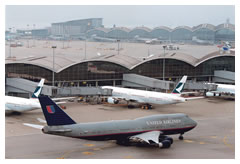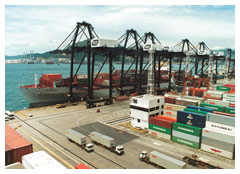Logistics and artificial intelligence
Gary Lo
In his 2001 Policy Address,
"Potentially, CityU can play an increased role in Logistics Hong Kong, with its advanced technologies and applied R&D experience," said Dr Andy Chun, Associate Professor in the Department of Computer Science and Chief Executive Officer of a spin-off company from CityU, BonVision Technology (Hong Kong) Limited, which is a leading provider of artificial intelligence (AI) applications. Dr Chun is the local expert on logistics scheduling and optimization and supply chain management.
AI gives Hong Kong an advantage
According to Dr Chun, there are several areas where AI can give Hong Kong a leading edge. For example, logistic service providers - whether land, sea or air - all use an enormous number of different resources, such as manpower, equipment, vehicles and space. Given the huge costs associated with using these resources, it makes sense to use them wisely, Dr Chun said. Resource and hence supply chain optimization can be achieved by using advanced AI algorithms and techniques, such as constraint programming, genetic algorithms and simulated annealing. Making use of these techniques will ensure that Hong Kong will be able to offer high-quality service at a very attractive price."CityU has a long history of research and applied R&D in these areas," Dr Chun said. In fact, back in 1994 he used AI techniques to optimize how check-in counters were allocated at the old Kai Tak International Airport. As a result, Hong Kong was able to handle thousands more flights each year, prior to the opening of the new airport at Chek Lap Kok.
Today, Dr Chun's Stand Allocation System (SAS) software is used at Chek Lap Kok to allocate parking spaces so that planes are parked at the "best" spot with maximum safety and convenience. The software uses AI and constraint-programming techniques to assign parking stands and schedule aircraft ground movement. In 1999, Dr Chun's system won an Innovative Application Award from the American Association for Artificial Intelligence - a first for Hong Kong. And in 2000, Dr Chun won the award for the second time, for his contributions to the Hong Kong Hospital Authority's Staff Rostering System.
Using AI to maximize resources
Dr Chun and his team have also applied AI techniques to other cargo handling companies, such as Hong Kong Air Cargo Terminals Ltd, Hong Kong International Terminals, and Modern Terminals Ltd. Using a sophisticated set of AI rules and constraints, such as priority, cargo type, flight schedules, pick-up schedules and resource capabilities, resource assignments are made automatically to handle and process each container within each arriving/departing cargo aircraft. "The system pays for itself by maximizing resource utilization, allowing the terminal operator to handle more business and generate more revenue," Dr Chun explained. CityU has also worked with other transportation-related companies, such as Hong Kong's Mass Transit Railway Corporation and the Kowloon Motor Bus Company to develop AI timetabling algorithms to increase service levels with limited resources.However, the application of AI techniques to logistics is not limited to resource optimising and scheduling, Dr Chun said. "Logistics require the collaboration of many parties and companies, all with their own peculiar processes, procedures and guidelines." Many companies are beginning to use AI rule-based techniques to help manage and monitor complex business processes and workflows, especially those that span organizational and geographical boundaries. "AI, combined with various e-business XML (Extensible Markup Language) standards, allows logistic companies to operate in real time, or what we refer to as zero latency."
Reaching the goals established by the Logistics Hong Kong initiative won't be easy, Dr Chun said. But he believes that both traditional offline logistics service providers as well as Internet-connected e-logistics service providers will benefit from CityU's technologies and applied R&D expertise. "The advanced computer science and AI techniques we've developed will really give Hong Kong an edge in this demanding knowledge-based society of ours."


